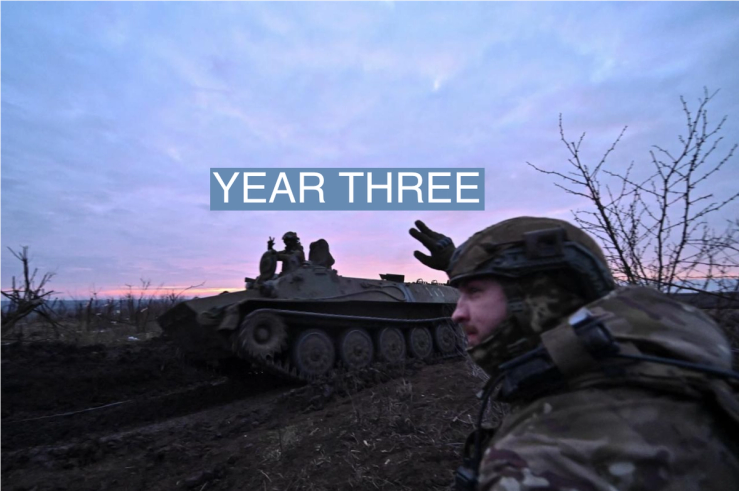The News
Russia’s war on Ukraine is entering its third year this week. Russian President Vladimir Putin appears to be using the stalemate to his advantage, trying to outlast Ukraine in the hopes that critical Western support for the nation eventually dries up.
More than 10,000 civilian casualties have been recorded since the war began, and the UN estimates the actual death toll to be much higher. United States officials estimated last year that at least 500,000 Russian and Ukrainian troops have been killed or injured in the war.
The Kremlin said it will not concede any of its territorial gains to Ukraine in a deal to end the war, despite suffering blows to its military and economy. But Russia’s capture of the Eastern stronghold of Avdiivka over the weekend has renewed the Kremlin’s assault on Eastern Ukrainian towns as President Volodymyr Zelenskyy warned allies that a lack of arms and ammunition was giving Russia room to advance.
SIGNALS
Russia isn’t winning the war — but it isn’t losing either
Despite Ukraine’s weak counteroffensive last year and U.S. aid in jeopardy, Russia isn’t winning the war. It has made only modest territorial gains in Ukraine, suffered a high number of estimated casualties, failed to establish a Russian sphere of influence, and reaffirmed the West’s support for Kyiv, according to Brookings scholars. But neither is Russia losing the war, argued Aslı Aydıntaşbaş of the European Council on Foreign Relations. It has so far avoided an economic and military collapse, and Putin’s resolve will be strengthened by the U.S. Congress’s wrangling over Ukraine aid and the potential of an anti-NATO Trump presidency. To end the war, the U.S. needs to look beyond either forcing Ukraine to negotiate with Russia or funding Kyiv indefinitely, and instead seek “compromises, half-measures, and half-baked solutions that last for decades,” Aydıntaşbaş said. “That’s how wars end — with deeply unsatisfactory results,” she added. So far, however, “peace in Europe is nowhere in sight,” and the prospects of negotiations to end the war this year are dim, experts told Foreign Policy.
Putin will press on with war at the cost of Russians’ desire for normalcy
Putin’s war in Ukraine is both to gain territory and maintain his political grip inside Russia, but there is a growing gap between his ambitions and Russians’ desire for a return to normalcy, The Economist wrote. Public protests in Russia are rare given the brutal crackdown on dissent, but residents have been expressing some signs of discontent, taking to the streets and erecting memorials after the death of opposition leader and prominent Putin critic, Alexei Navalny. Russians’ support for the war is gradually weakening, but a full-fledged anti-war movement is unlikely because “what people crave is a return to normalcy, not a revolution,” The Economist wrote. However, Putin is likely to press on with his military goals and dial up repression in Russia, because “his regime can now only exist in a state of war.”
Don’t write off Ukraine just yet
Despite the stalemate and disappointing counteroffensive, “Ukraine remains stronger than you think,” defense expert Michael O’Hanlon argued in The Washington Post, citing its strong defense against drones and cruise missiles, “robust” foreign assistance, and largely intact critical power and heating systems this winter. O’Hanlon predicted that Ukraine might be able to hold on to at least 82% of its territory, but that its success largely depends on the U.S.′ continued aid to Kyiv. Ukrainians are “still here” and “still fighting,” Ukrainian historian Olena Stiazhkina wrote in an essay for The New York Times. She wrote that for Ukrainians the war “has not been two years but 10, from when Russian forces annexed Crimea and invaded the Donbas.” She said that while Ukrainians will keep fighting “for ourselves” and for a safer world, the country “desperately” needs more weapons.



